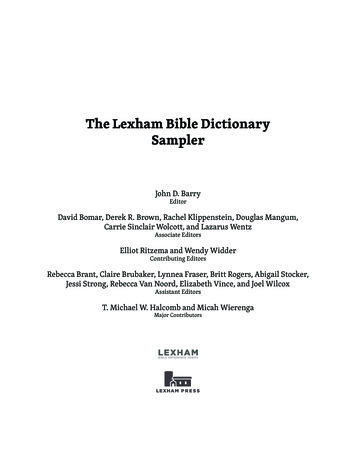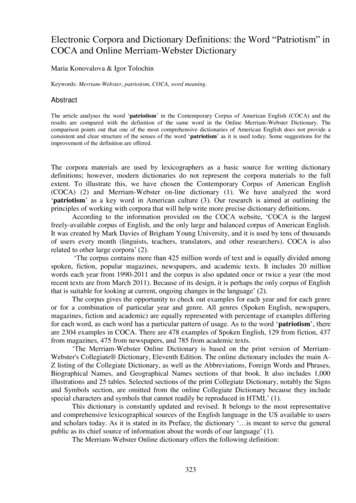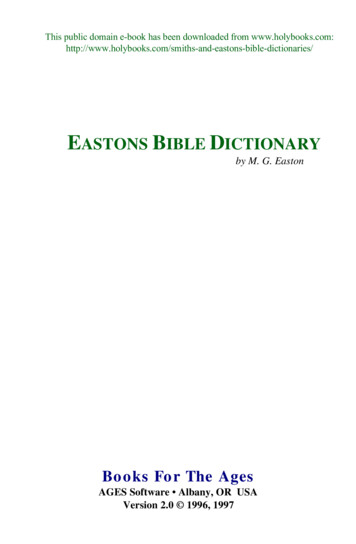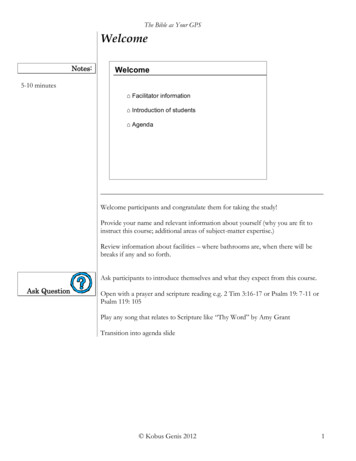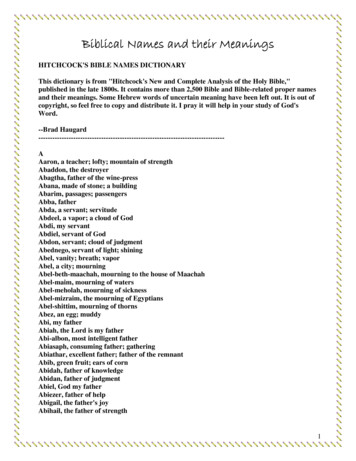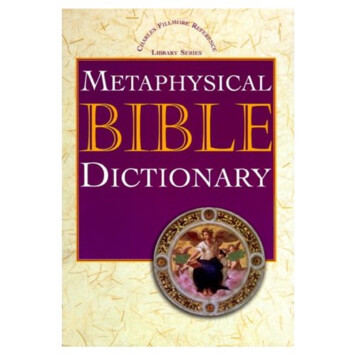
Transcription
Aaron, aar'-on (Heb.)--illumined; enlightener, mountaineer (very lofty).Brother of Moses; of the Israelitish tribe of Levi, and first high priest of Israel (Exod. 6:2028:1-4).Metaphysical. Executive power of divine law. Aaron, the first high priest of Israel and the bearerof intellectual light to the Israelites, signifies the ruling power of the intellectual consciousness. Themaking of the "molten calf" by Aaron (Exod. 32:1-8) signifies the false states of thought (idols) that manbuilds into his consciousness when he perceives the Truth but does not carry his spiritual ideals intoexecution, choosing instead to let his thoughts function in a lower plane of consciousness.In Exodus 40:12, 13, Aaron and his sons typify spiritual strength, which becomes the presiding,directive power of a new state of consciousness. Through spiritual strength there is set up an abidingthought action that contributes to the building of the holy Temple (redeemed body). Bringing Aaron andhis sons to the door of the tent of meeting and washing them with water means that we should declarespiritual strength to be the presiding, directive power of this new state of consciousness--not a mereanimal strength, but a strength purified from all grossness of sense. This declaration of strength isabsolutely necessary to the permanency of the body tabernacle. Through it is set up an abiding thoughtaction that continues while one's attention is elsewhere: Aaron continues to minister in his priestlyoffice.Abaddon, a-bad'-don (Heb.) --destroyer; destruction.Called Apollyon, in the Greek tongue. Said to be king over the great army of locusts that cameout from the abyss to destroy (Rev. 9:2-11).Metaphysical. That this name has reference to a very destructive belief of man's is evident fromthe meaning of the name and from the 9th chapter of Revelation. From Exodus 10:14, 15 and Joel 2:3-10(compare these texts with their references and you will see that they all are speaking of the same thing)one can get an idea of the destructiveness of the locusts of Palestine and the surrounding countries. Theyquite commonly came up like great armies and ate every living plant in their path; also, the leaves andthe branches of the trees. So Abaddon must stand for the error belief in utter destruction of life and form.The true life principle can never be destroyed; only the outer form of man's belief in materialityis destructible. So long as man believes in materiality or destruction, the outer destruction of forms willtake place. It is very necessary, therefore, that the thought of the possibility of life's being destructible,or in any way limited, be erased entirely from the consciousness. "There is only one Presence and onePower in the universe --the Good omnipotent." Life is omnipresent, eternal, sure; life cannot bedestroyed, because it is God Himself.Abagtha, a-bag'-thå (Pers.)--happy; prosperous.One of the seven eunuchs, or chamberlains, who served in the palace of Ahasuerus, king ofPersia (Esther 1:10).Metaphysical. A eunuch, in consciousness, represents a thought from which the capacity toincrease life and its forms has been eliminated. The chamberlain, in this instance, is a keeper of theking's bedchamber. Abagtha therefore represents a pure, happy, prosperous thought guarding andministering to the king (the will). This thought is not spiritual (Abagtha was not of Israel), but it is of the
outer realm, or realm of phenomena. The Medes and Persians are thought to have been descended fromJapheth (one of the sons of Noah), who typifies the intellect or reason. The thoughts that they signifytherefore belong to the mental and the psychic in man. Seven signifies perfection or fullness on thenatural plane of consciousness.Abanah (A. V., Abana), ab'-a-nah (Heb.)--permanent; enduring; perennial; a rock, a stone;stony.A river in Syria (II Kings 5:12). This river flows through Damascus, which is one of the oldestknown cities of the world.Metaphysical. The name symbolizes something constantly renewing, therefore permanent andenduring. From its setting, however, the river Abanah signifies intellectual thoughts and reasoningsabout life. A river represents a current of thought. The thoughts of the intellectual domain (Syria) apartfrom the real life current in the organism (the Jordan symbolizes this current in the instance of thehealing of Naaman the Syrian, who thought that he could just as well wash in the rivers Abanah andPharpar of Syria as in the Jordan) and apart from the loving, spiritual power of the I AM (Elisha) haveno healing potency. Intellectual thoughts become permanent only when the intellect is quickened bySpirit and becomes transmuted into spiritual consciousness.Abarim, ab'-a-rim (Heb.)--regions beyond; passages; fords; crossings.A range of mountains in the country of Moab, opposite Jericho (Num. 33:47, 48; Deut. 32:49).Metaphysical. The Moabites were descended from Lot, whose name means hidden, a covering,dark colored. Lot's domain is the flesh, the part of man's consciousness that is still in darkness.Mountains are high places in consciousness. Among the peaks in this range of mountains (Abarim) areNebo, Pisgah, and Peor. It was from the top of one of these mountain peaks that Moses was shown theland of Canaan, which was to be possessed by the Israelites. It was there that Moses died, that the Mosesconsciousness or understanding of divine law was merged into the I AM (Joshua), positive expression ofthe law. Abarim, therefore, though situated in Moab (the flesh or carnal consciousness) represents high,inspiring thoughts that look away from error over into the Promised Land; that see the possibility of theelevation of the whole man, spirit, soul, and body, to spiritual consciousness.abate--To lessen; to moderate. In making a demonstration, when we reach the point where themind changes from the negative to the positive state the troubled thoughts begin to abate. A certain setof negative ideas has run its course, and the restorative thought forces are in evidence.Abba, ab'-bå (Aram.)--father.A word of endearment signifying my father (Mark 14:36; Rom. 8:15; Gal. 4:6).Metaphysical. In olden times a slave or menial servant was not allowed to call his master (thelord or head of the house) Abba. Only the children of the family could do this, or some one in closerelationship or association, because it was an indication of the tenderest affection. When Abba is used inthe Bible the word Father follows it and therefore gives emphasis to the term. It is only as we come toknow our sonship, our true relation to God, that we enter into the consciousness of love and tenderaffiliation with Spirit that is signified by the word Abba.
Abda, ab'-då (Aram.)--servant; a servant of God is implied; also slave ; worshiper; worshiper ofGod.a Father of Adoniram, one of the princes of King Solomon who "was over the men subject totaskwork" (I Kings 4:6). b Son of Shammua, a Levite who returned from the Babylonian captivity (Neh.11:17).Metaphysical. The idea of spiritual work or service, but containing a thought of bondage(servant, slave, worshiper). This idea of service was lifted to a higher level in the son, Adoniram,meaning my lord is high, my lord is exalted, or lord of heights.Abdeel, ab'-de-el (Heb.)--servant of God.Father of Shelemiah, who was one of those whom the king of Judah, Jehoiakim, sent to takeJeremiah after he (the king) had burned the roll that contained the law of God (Jer. 36:26).Metaphysical. A thought of service to God (servant of God), but dominated by the ignorant,disbelieving will (Jehoiakim, the king). Jehoiakim, the king (the will). has the capacity to establish Godin consciousness, since the name Jehoiakim means whom Jehovah hath set up, Jah establishes, and thewill in man has the power to accept or to reject Truth. Jehoiakim, however, represents a ruling state ofmind that does not reverence or obey the higher law and is not receptive to new ideas; therefore Abdeelsignifies a thought of service to God that is in bondage to old established religious ideas that persecuteman's inner spiritual faith and discernment (the prophet Jeremiah). Jeremiah also signifies the exaltedstate of thought that connects us with Divine Mind and demands that all our religious thoughts(Israelites) be faithful in observance of divine law.Abdi, ab'-dl (Heb.)--my servant; servant of Jah.a Son of Malluch (I Chron. 6:44) and father of Kish, of the Levites (II Chron. 29:12). b A son ofElam (Ezra 10:26).Metaphysical. Thoughts that serve Jehovah or are subject to Jehovah (my servant, servant ofJah). The first mentioned Abdi signifies a thought that springs from counseling with Spirit andmeditating on divine law. The father of this Abdi was named Malluch, which means counselor.Abdi, the son of Elam, represents a thought of service to God that is established in an idea ofyouth and strength (Elam means fully developed, a young man) but is united to a physical or carnal soulquality (he was married to a foreign wife). This carnal idea has to be given up. The Israelites had toseparate themselves from their foreign wives and from the children (mixed thoughts) that had come ofunion with them.abdicate--To let go; to relinquish; to renounce. The ability to abdicate is twofold in action: iteliminates the error, and it expands the good. When the ego consciously lets go and willingly gives upits personal ideas and loves, it has fulfilled the law of denial and is restored to the Father's house.Abdiel, ab'-d1-el (Heb.)--servant of God.A Gadite, who lived in Gilead in Bashan (I Chron. 5:15, 16).
Metaphysical. Gad means fortune, or fortunate; also, a troop, and refers to the power faculty inindividual consciousness. (See GAD.) Gilead means enduring rock, and Bashan means smooth, fertilesoil, fruitful. So it is quite evident that the thought of service that Abdiel (servantof God) typifies has reference to the expression of power and strength in relation to bountiful supply andincrease of good.Abdon, ab'-don (Heb.)--servile; service; a servant.a A judge of Israel. He had "forty sons and thirty sons' sons, that rode on threescore and ten asscolts: and he judged Israel eight years" (Judg. 12:1315). b The name of a city in Asher that was given to"the children of Gershon, of the families of the Levites" (Josh. 21:30).Metaphysical. A phase of the judging, discerning faculty in man. Abdon served Israel as judge.The forty sons imply a thought of completeness, and the seventy ass colts refer to the animal part of manas expressed through the seven senses, seventy being a multiple of seven and showing a tenfold increaseof the expression of this animal phase of consciousness, which was held in dominion by the thoughts forwhich Abdon's sons and sons' sons stand. The riding of Abdon's sons and sons' sons on seventy assesshows that in thought the animal phase of man symbolized by the ass (meekness, stubbornness,persistency, and endurance) is in subjection. (One meaning of servile is held in subjection.)"And Abdon. . . . died, and was buried in Pirathon in the land of Ephraim, in the hill-country ofthe Amalekites" (Judg. 12:15). This means that, as the thought of good judgment, service, and dominionover the animal phase of man (symbolized by Abdon and by the riding of his sons and sons' sons on theasses) sinks deeper into the consciousness, a fuller uplifting of the animal forces, appetites, and passions(Amalekites) may be accomplished.The city of Abdon symbolizes a happy (Asher), fixed state of consciousness, or an aggregationof thoughts of judgment and service utilized by the natural religious tendencies (Levites) of theindividual, from which opposite thoughts of error have been expelled. (Gershon means expulsion.)Abed-nego, a-bed'-ne-go (Aram.)--servant of Nego or Nebo.A friend of Daniel's, by the name of Azariah, to whom the name Abed-nego was given by theprince of the eunuchs of King Nebuchadnezzar of Babylon (Dan. 1:7). He was of the tribe of Judah, ofroyal blood, and was skilled in all wisdom (Dan. 1:3, 4, 6). He was one of the three (Abed-nego,Meshach, and Shadrach) who came out of the fiery furnace unharmed (Dan. 3:12-30).Metaphysical. Light, understanding. Nebo was a Babylonian and Assyrian deity who representedthe planet Mercury. Nebo was worshipped as the god of wisdom, and was believed to be the scribe andinterpreter of the gods. The name Nebo, according to The New International Encyclopedia, meansannouncer, proclaimer.Abel, a'-bel (in Hebrew, heh-bel)--breath or vanity; transitoriness; a breath; vapor.Second son of Adam and Eve, killed by his brother Cain (Gen. 4:2-8).Metaphysical. Abel means breath, which places him in the air, or the mental realm. Herepresents not the spiritual mind but the mind that controls the animal functions--he was a sheep raiser.The mental is more closely related to the spiritual consciousness than the physical (Cain) is, and its
offerings are more acceptable to Spirit than are those of the physical. In Hindu Metaphysicalphysics,Abel would be termed the animal soul. Paul would call him the creature.Abel, a'-bel (in Hebrew, aw-bali)--meadow; fresh; grassy; a grassy place.A great stone "in the field of Joshua the Bethshemite," "whereon they set down the ark ofJehovah" (I Sam. 6:18, see marginal note also).Metaphysical. A very firm, abiding realization of substance in consciousness.Abel-beth-maacah, a'-bel-beth-ma'-acah (Heb.)--meadow of the house of Maacah; meadow of thehouse of oppression.A city of Naphtali (I Kings 15:20; II Kings 15:29); in II Chronicles 16:4 it is called Abel-maim.Metaphysical. Abel means meadow. A meadow is a grassland, and is generally used to providegrass and hay forABEL-MEHOLAHdomestic animals, principally horses, cattle, and sheep. These animals symbolize the physical strengthand the natural vital forces of the human organism Abel therefore stands for a substance state ofconsciousness by which the animal forces of the body are sustained.Naphtali refers to the strength center in man This center is located in the region of the kidneys,whose office is to eliminate certain watery elements from the blood.Beth means house, and Maacah means oppression, depression, or pressed down, worn. Abelbeth-maacah, meadow of the house of oppression, a city of Naphtali, therefore signifies the weigheddown, worn-out feeling that we experience when our strength (Naphtali) has been given over to thephysical and our substance has been dissipated through sense activity. When this condition obtains, thewhole vitality is lowered; the depression usually strikes first at the pit of the stomach, the substancecenter in consciousness.Abel-beth-maacah also was called Abel-maim, meadow of waters. Waters symbolize an unstable,changing element in consciousness; waters often stand for a cleansing quality also. So the substance inour organism must be cleansed, uplifted, and transmuted (changed) into its original spiritual essencebefore it becomes stable, abiding.Abel-cheramim, a'-bel-che-ra'-mim (Heb.)--plain of the vineyards; meadow of the vineyards.A small town to the east of the Jordan (Judg. 11:33).Metaphysical. A fixed state of thought in which the idea of the substance of life predominates.Abel, or meadow, stands for substance, while a vineyard (grapes) always suggests life.Abel - meholah, a'-bel - me-ho'-lah (Heb.)--meadow of the dance; dancemeadow.A town that is mentioned in connection with Gideon's victory over the host of Midian (Judg.7:22; see also I Kings 4:12; 19:16). This town is supposed to have been in the Jordan valley.
Metaphysical. An aggregation of joyous, harmonious thoughts of substance activity, or of theactivity of substance.Abel - mizraim, a'-bel - miz'-ra-im (Heb.)--mourning of Egypt or Egyptians; mourning ormeadow of distress.The name was given by the Canaanites to the threshing floor of Atad, because it was there thatJoseph, his brothers, and the Egyptians who were with them mourned seven days for Jacob, while theywere on their way to bury him in the cave of the field of Machpelah, where Abraham and Isaac wereburied (Gen. 50: 11).Metaphysical. The feeling of sorrow and loss, in the sense man, that often accompanies theletting go of some good idea in consciousness after it has finished its work. Man's tendency is to cling tothe old ideas that have been helpful to him. But when their work is done in the individual for the timebeing, these old ideas, no matter how well they have served, must be released from consciousness, thatother and higher ideas may take their place. In the Bible a threshing floor always typifies a process ofjudgment, a sifting of ideas and thoughts in consciousness, a letting go of the chaff and a laying hold ofthe wheat.Abel-shittim, a'-bel-shit'-tlm (Heb.)--meadow of the acacias; place of acacias.A town "in the plains of Moab" (Num. 33:49). It is more often called Shittim. (See SHITTIM.)Metaphysical. A perception, or conception, of the substance, reality, and resurrecting power ofthe inner spiritual life. (Acacias refer to resurrection, life, and a meadow refers to substance).Abi, a'-bl (Heb.)--Jah is father; founder; an old form of father of, which forms the first part ofseveral Hebrew proper names; progenitor.Daughter of Zechariah, and mother of Hezekiah, king of Judah (II Kings 18:2). In II Chronicles29:1 she is called Abijah.Metaphysical. The inner conception, in the soul, of Jehovah as Father, or source of being (Jah isfather). This comprehension of Truth, held in mind (see AHAZ--meaning to lay hold of--husband ofAbi), is the mother of, or brings to pass in consciousness, that which Hezekiah, kingABIBof Judah, represents--faith in God, or the expression of spiritual strength.Abi-albon, a'-bl-al'-bon (Heb.)--Jather of strength; father of valiance; father of prevailing.One of David's mighty men (II Sam. 23:31); he is called Abiel in I Chronicles 11:32.Metaphysical. A mighty thought of conquest.Abiasaph, a-bl'-a-saph (Heb.)--father of gathering.A descendant of Levi (Exod. 6:24). He is called Ebiasaph in I Chronicles 6: 37.
Metaphysical. A thought in consciousness, of a kind that gathers together, or draws together(father of gathering). Such thoughts belong to the love (Levi) nature in man. They are of a harmonizingcharacter and they help to hold the organism together.Abiathar, a-bl'-a-thär (Heb.)--the great one is father; father of abundance.Fourth high priest in descent from Eli. He was high priest during David's reign and at thebeginning of Solomon's reign (I Kings 2:26).Metaphysical. A ruling religious belief that abundant good comes from recognition of God asFather (the great one is father, father of abundance) and of David (love) as king (the directive orguiding quality of the will). Though excellent, the intellectual thought represented by Abiathar has in theend to take a lowly position, and his place is taken by Zadok, the true high priest, who represents aspiritual quality. Zadok was a descendant of Aaron, through Aaron's eldest son, Eleazar.Abib, a'-bib (Heb.)--month of green ears; sprouting; budding; to fructify, properly, an ear ofgrain; green fruits.The first month of the ecclesiastical, and seventh of the civil, year of the Hebrews; itcorresponded to parts of our March and April (Exod. 13:4; 23:15; Deut. 16:1). It is called Nisan inNehemiah 2:1 and in Esther 3:7.Metaphysical. In Spirit there is no time; there are only growth and steps in unfoldment ofconsciousness. In the spiritual realm the days, months, and years by which man counts time representdegrees or steps in growth and attainment. Considered in a spiritual light, Abib symbolizes a period ofresurrection out of the old (it was on the fifteenth of this month that Israel left Egypt) and a bringingforth of fruit to newness of life. (See NISAN.)Abida, a-bl'-då (Heb.)--father of knowledge, i. e., knowing; father of wisdom; father ofunderstanding.Son of Midian (Gen. 25:4).Metaphysical. The belief that knowledge comes through the senses (father of knowledge, i. e.,knowing). The Midianites, descendants of Midian, were enemies of the Israelites. They representcontentious thoughts, and judgment or discrimination in sense consciousness. The judgment of thesenses, based on outer appearances, produces discordant thoughts, jealousies, and so forth.Abidan, ab'-l-dan (Heb.)--father of judgment, i. e., a judge.A Benjamite who was chosen by Jehovah a prince over the tribe of Benjamin, in the wilderness(Num. 1:11).Metaphysical. Abidan's father was Gideoni, meaning like Gideon, destroyer of error; warlike.Benjamin (son of the right hand) means dexterous, skillful, expert, quick. Abidan (father of judgment, ajudge) therefore stands in consciousness for a strong, influential thought of righteous discrimination, orjustice, with power to execute its decisions. Abidan was first appointed chief man over the Benjamites,in accordance with Jehovah's command to Moses, for the purpose of numbering the people, to find outhow many men of the tribe were above twenty years of age and able to go to war.
abide--To continue in a fixed thought of God, the All-Good; to dwell in the Christ consciousness."If ye abide in me, and my words abide in you, ask whatsoever ye will, and it shall be done unto you"(John 15:7).abiding--A conscious centering of the mind in divine Principle within us by means of repeatedaffirmations of our faith and trust in Principle.abiding Presence--Christ, the presence of light, peace, joy, love, life, and substance that is everwithin, about, before, and beside man. (see presence of God)Abiel, a-bl'-el (Heb.)--God is father; father of might; father of strength; my father is God.a Father of Kish and grandfather of Saul (I Sam. 9:1; 14:51). b "The Arbathite," one of David'smighty men (I Chron. 11:32); this Abiel is called Abi-albon in II Sam. 23:31.Metaphysical. A mighty thought, a thought of great power and strength, which has its source inGod (God is father, father of might, father of strength, my father isABIHUDGod). (See ABI-ALBON.)Abiezer, a-bl-e'-zer (Heb.)--father of help; succoring father.A man of Manasseh, from whom Gideon was descended (Josh. 17:2; Judg. 6:11, 15). InNumbers 26:30 he is called Iezer. (Iezer means he will help; he will succor.)Metaphysical. The acknowledgment that God (Spirit) is the source of understanding and of alltrue help (father of help; succoring father; a man of Manasseh).Abigail, ab'- i-gail (Heb.)--father of joy?/; source of exultation or cause of delight.a A Carmelitess (See I Chron. 3: 1) who was David's wife (I Sam. 25:3, 42). b David's sister (IChron. 2:16).Metaphysical. The idea back of this name and of its association with David is that joy comesfrom God and should go with his love (David). A Carmelitess signifies abundance. Thus we see that joyand abundance are closely connected. (See AEIINOAM.)Abihail, ab-;-ha'-;l (Heb.)--father of might; father of strength; father of brilliance; father ofsplendor.A name given to both men and women of the Bible (Num. 3:35; II Chron. 11: 18; Esth. 2:15).Metaphysical. The idea that power, strength. honor, and glory originate in God and are spiritualin their true character (father of might, father of strength, father of brilliance, father of splendor).Abihu, a-bl'-hu (Heb.)--father is (he who is) God; whom he (God) is father of; he who is (my)father; God is father.One of the sons of Aaron. With his father and his brothers, he was set apart for the priesthood(Exod. 6: 23; 28: 1; Lev. 10: 1, 2).
Metaphysical. The priesthood points to the Christ, sonship. The Christ, the Son of God, wasperfectly demonstrated in Jesus Christ, and must be demonstrated in all men. Abihu stands for an idea ofdivine sonship (father is God; God is father).Abihud, a-bl'-hud (Heb.)--father of majesty; father of vigor, youth; father of praise. Grandson ofBenjamin (I Chron. 8:3). Metaphysical. The idea that true authority, praise, wholeness, and might havetheir inception in, and come from, God (Spirit).Abijah (in A. V., I Chron. 2:24; 7:8; Matt. 1:7; Luke 1:5, name is given as Abiah and Abia), abl'-jah (Heb.)--whose father Jehovah is; (my) father is Jah; (my) father is Jehovah.The Bible mentions several persons of this name (I Sam. 8:2; I Chron. 3:10).Metaphysical. Abijah refers to manifest man as being the offspring of the Christ, or Jehovah God(whose father Jehovah is. See Genesis, 2d and 3d chapters). Though this is a true, spiritual idea, not allthe Biblical characters named Abijah carried out the Christ principle in their lives. Some were of thepriesthood, and lived according to the Christ principle to a greater or less extent, while others, thoughIsraelites, wandered far from the ideal that the name Abijah signifies. For instance, we are told thatAbijah, king of Judah (called Abijam in I Kings 15:18), walked in all the sins of his father, Rehoboam.(See I Kings 15:3.)Abijam. See ABIJAH.Abilene, ab-l-le'-ne (Gr.)--a plain; region of Abila; fr. Abila, land of meadows.A rich, fertile Syrian district or tetrarchy, governed by Lysanias at the time of the beginning ofthe ministry of John the Baptist (Luke 3:1-3). Its name was taken from its capital city, Abila.Metaphysical. Assyria, the Syrians, and John the Baptist all refer to various phases of theintellect and its activities. Abilene therefore represents a richness and a fertility of intellectual capacitythrough which Spirit can work to bring about in the individual a perception and acceptance of Truth.Abimael, a-bim'-å-el (Heb.)--a father from God- (my) father from God; father of Mael or fatherof abundance.Son of Joktan, a descendant of Shem, one of Noah's sons, and supposed to have been the founderof an Arabian tribe (Gen. 10:28).Metaphysical. A thought of man as being descended from God; also a thought of abundance ascoming from God (a father from God, father of abundance). The thought that the name Abimaelsignifies, however, at this stage of man's unfoldment, is not established in consciousness with enoughpositiveness to produce spiritual results. Arabia means barren, sterile, wild; and in consciousnessArabians represent unproductive thoughts.Abimelech, a-bim'-e-lech (Heb.)--father of the king; Melek (the king) is father; a royal father.a Kings of Gerar in the time of Abraham and Isaac (Gen. 20: 2-18; 26: 1). Abimelech was thename of a line of Philistine kings. b A son of Gideon, or Jerubbaal, by his concubine in Shechem (Judg.
8:31; 9:1). This Abimelech slew all his brothers, except one who escaped, and made himself ruler afterhis father's death. c A priest in the time of David (I Chron. 18:16).Metaphysical. The will. Most of the Bible characters of this name stand for some phase of theunregenerate will, but Abimelech of I Chronicles 18:16, a priest of Israel in David's time, is anexception. In his case spiritual rulership is suggested, or at least a higher form of intellectual rulershipthan that of the unregenerate will. This Abimelech stands for the intellectual thought or tendency thataccepts and acknowledges God as the supreme ruler in man's consciousness.Abinadab, a-bin'-a-dab (Heb.)--father of generous abundance; father of liberality; (my) father isnoble.The name of several men who are mentioned in the Bible (I Sam. 7:1; 16:8; 31:2).Metaphysical. The Abinadab spoken of in I Samuel 7:1 and II Samuel 6:3, 4 represents the realmof unlimited mind. It was in his house, "in the hill" (superconsciousness), that the Ark of the Covenantwas kept for many years.Abinadab, brother of David (I Sam. 16:8), represents an extreme in consciousness. He stands forvery high aspirations (my father is noble). High aspirations alone, however, do not fit one for kingship.David's faithful service in the humble walks of life seems to have been an important factor in preparinghim for his greater ministry. "He that is faithful in a very little is faithful also in much" (Luke 16:10).Abinadab, son of Saul (I Sam. 31:2), represents a phase of the physical will in its control ofbody. Abinadab and his brothers met death in battle, at the hands of the Philistines; their father, Saul,died by his own hand in the same battle, to avoid being captured. This incident symbolizes thedissolution of the whole organism, the result of disobedience to the Lord, or law of Being.Abinoam, a-bin'-o-am (Heb.)--father of pleasantness; father of delight; father of graciousness.An Israelite, of the tribe of Naphtali, and father of Barak the judge, who, with Deborah theprophetess, delivered Israel (Judg. 4: 6 ; 5: 1).Metaphysical. The strength (Naphtali) of beautiful, pleasant, gracious thoughts, whose trueorigin is God--Divine Mind (father of pleasantness, father of graciousness, father of delight).This name seems to suggest the thought that delight, pleasantness, sweetness, and beauty are theresult of giving oneself over to the expression of sense in the physical. This is a mistake that mortal manhas always made, but he must rise to the understanding that all real joy and grace come from Spirit andare the result of high, pure, spiritual thinking.Abiram, a-bl'-ram (Heb.)--father of elevation; father of altitude, i. e., high or proud; the exalted(one) is (my) father; high father.a Son of Eliab, one of those who conspired against Moses and Aaron and was swallowed up bythe earth (Num. 16:1-33). b The eldest son of Hiel the Bethelite, who rebuilt Jericho (I Kings 16:34)Metaphysical. This name can denote either the arrogance of pride or the nobility of true spiritualexaltation. Abiram, the son of Eliab, signifies presumptuous, arrogant, and rebellious thoughts ortendencies that are caused by spiritual pride (father of altitude, i. e., high or proud).ABISHALOM
The Abiram of I Kings 16:34 symbolizes a lofty thought, or spiritual ideal (the exalted one is myfather).Abishag, ab'-i-shag (Heb.)--father of error; father (cause) of wandering; father of ignorance.A Shunammite woman, very beautiful and young, who became the wife of David and ministeredto him (I Kings 1:1-4).Metaphysical. The meaning of Abishag,
the Bible the word Father follows it and therefore gives emphasis to the term. It is only as we come to know our sonship, our true relation to God, that we enter into the consciousness of love and tender af


